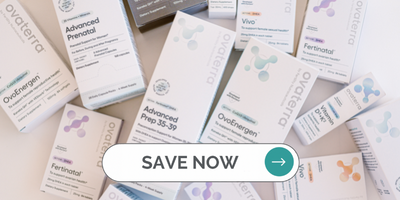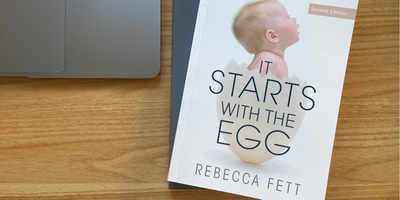You may wonder if it is possible to have a baby at 40. The answer is often yes!
While having a baby at 40 can come with a few considerations, more and more women are becoming mothers later in life. The number of women becoming pregnant between the ages of 40 and 44 has more than doubled in the last 30 years.
Let’s discuss what you need to know about having a baby at 40.
Does age affect fertility?
They say that age is “just a number,” but the reality is that women’s ages do play a role in their reproductive health. So, acquiring the right knowledge on later-in-life pregnancies can be helpful when you plan to become a mom in your 40s.
Chances of natural conception starts to decline for women during their early 30s. The drop accelerates further in their late 30s. This decline is due to the decrease in the number of eggs left in your ovaries, as well as a drop in egg quality, which impacts embryo quality. For men, fertility starts to be affected after around age 45, though the age-related decline in fertility is less pronounced among men.
When age is a factor on your fertility journey, you may want to seek care sooner from your healthcare provider. Your OBGYN or a fertility specialist can do fertility testing to help you understand where you stand, and develop a plan of action.
Although your pregnancy chances decrease as you age, it doesn’t make it impossible to be a mom at 40. Many women in their 40s have normal ovulation, healthy ovarian reserve, good uterine anatomy and so forth - if your reproductive health is in good shape, motherhood can still be possible at 40 or later.
What are the benefits of having a baby at 40?
You might be of advanced maternal age after 35, but that’s okay. Many women are becoming pregnant at an older age because it allows them to reap valuable benefits, like financial stability and more. Let’s review some of the benefits of becoming a mom later in life.
Financial security
Most people can agree that being financially stable is an important thing to consider when deciding to start a family. At the age of 40, you have most likely had time to advance in your career and be in a better financial position than when you were younger. Financial stability can offer families more opportunities to provide safe housing, healthy foods, and other essentials in life.
And let's face it - fertility journey itself can be expensive. Having resources to finance your fertility journey means one less thing to worry about during this stressful time of your life.
Higher education
Studies show that women who conceive later in life tend to have higher levels of education, which totally makes sense. Giving yourself the time and space for education and career development can be a big benefit to waiting.
Later birth cohort
Having children later means that your children are in a later birth cohort. The child may benefit more from cultural and economic developments that come with time. As the world evolves and our minds expand, this gives children more opportunities across the board.
Emotional and social maturity
With age typically comes emotional and social maturity. Not to say that younger parents do a poor job of parenting, but becoming a mom in your 40s may mean that you have more emotional and social tools at your disposal to deal effectively with the challenges that your child will surely throw your way.
Is a pregnancy at 40 considered high-risk?
A high-risk pregnancy is any pregnancy that may threaten the health and life of the mother and baby. Age is one of the factors of a high-risk pregnancy.
Statistically, women of advanced maternal age have an increased risk of complications, such as preeclampsia and gestational high blood pressure.
However, significant advances in technology and prenatal care have made it possible to have a healthy pregnancy and a healthy baby at the age of 40 or later.
Is it safe to have a baby at 40?
As long as you seek proper prenatal care and understand the risk factors of becoming pregnant at 40 and above, it can absolutely be safe to conceive a baby in your 40s.
As one study (among many) showed, women between the ages of 40 and 45 do have higher risks during their pregnancy. Being informed is crucial for anticipating and managing your risks.
What risks can you expect during pregnancy at 40?
Any pregnancy comes with some risks, but as you get older, those risks get higher. It’s partly because of the declining egg quality, and partly because our bodies are simply more susceptible to chronic health conditions when we are older. Pregnancy puts stress on your body, and when you are in your 40s, your body can be a bit less able to handle the stress.
So, pregnancy at an older age usually means you will be monitored more closely by your healthcare provider. With proactive prenatal care, you and your doctor can pick up on any signs of developing age-related complications and mitigate the situation quickly.
Possible risks you may be monitored for can include:
- Preeclampsia
- Gestational diabetes
- Premature birth or stillbirth
- Miscarriage or pregnancy loss
- Genetic disorders, including chromosomal abnormalities like Down syndrome
What are the common complications of giving birth at 40?
Some of the most common complications during pregnancy at 40 include gestational diabetes, preterm birth, and C-sections. These complications can occur at any age but can be more prevalent in late pregnancies.
Gestational diabetes
Gestational diabetes occurs when insulin, a hormone responsible for moving sugar into cells to be used for energy, can’t do its job sufficiently because of other hormones that naturally increase during pregnancy. This is called insulin resistance, and this typically goes away after delivery.
About 2 to 10% of women develop gestational diabetes during pregnancy. Your chances of developing gestational diabetes increase after the age of 25. With proper management, however, gestational diabetes generally does not negatively affect the health or development of the baby. Picking up the signs and managing the condition proactively is key.
Preterm birth
The birth of a baby before 37 weeks is considered “preterm.” You may be at a higher risk of preterm birth if you are over the age of 35 (or younger than 17). In 2020, 14.4% of women 40 and above had a preterm birth, compared to 10.3% of women between 30 and 39 years of age.
C-section
Being of advanced maternal age can increase the chance you’ll need a C-section (short for cesarean section), rather than giving birth through your vagina.
Some researchers have hypothesized that this is because of the higher prevalence of pregnancy complications and general chronic diseases among women over 40, but statistical analyses haven’t borne out this theory. Why C-section rates go up with age is still a bit of a mystery.
How can I have a healthy pregnancy at age 40?
Today, we know many ways to have a healthy pregnancy in your 40s. Here are some things you can do to support a healthy pregnancy:
- Be sure to get all your essential nutrients every day. While pregnant, you will need nutrients such as folate (folic acid), iron, choline, vitamin D, calcium, DHA, iodine and more. Your nutritional needs increase massively to support the growing baby (and you). You can get these vitamins and minerals from many whole foods, but most likely, you will need to take prenatal vitamins to ensure you are receiving the proper daily recommended amount.
- Seek prenatal care as early as possible. Seeing a healthcare provider as soon as you plan on trying for pregnancy can help you understand how you can keep you and your baby healthy during your pregnancy. It is also beneficial if you have a general health checkup before becoming pregnant to be aware of - and get under control - any health conditions that may make you more susceptible to pregnancy-related health concerns.
- Eat a balanced diet. Eating healthy and nutritious meals can help support you and your baby’s overall health. Eating a variety of food groups each day will help you get the nutrients you need to promote a healthy pregnancy.
- Maintain a healthy weight before and during pregnancy. Maintaining a healthy weight can help lessen the risks of certain congenital abnormalities and pregnancy complications, such as gestational diabetes, high blood pressure, and preeclampsia.
- Quit smoking and put adult beverages on hold. Smoking increases the risks of complications like preterm birth and birth defects, and can hinder the baby’s development well after birth. Alcohol has similar effects. Stop smoking and drinking alcohol as soon as you know you’ll start trying to get pregnant.
The bottom line
Getting pregnant at 40 is often possible, even though it may come with a little more risk and take longer. The pregnancy success rates for women in their 40s have increased significantly in the last few decades, likely due to the new reproductive technology available.
Talking to your doctor or OB-GYN can help you better understand the risks and complications that may occur during your pregnancy at 40 and manage them proactively for a healthy pregnancy and delivery. So, be proactive when you are trying to get pregnant in your 40s - it may take longer and come with higher risks, but you are not alone.
Please reach out if you have any questions about getting pregnant or maintaining a healthy pregnancy in your 40s. We are with you.
Ovaterra provides reproductive health resources for general, educational purposes only. This content is not intended to replace medical advice from a qualified healthcare professional. Similarly, when making your financial decisions, please consult qualified financial professionals who can make individual recommendations.










